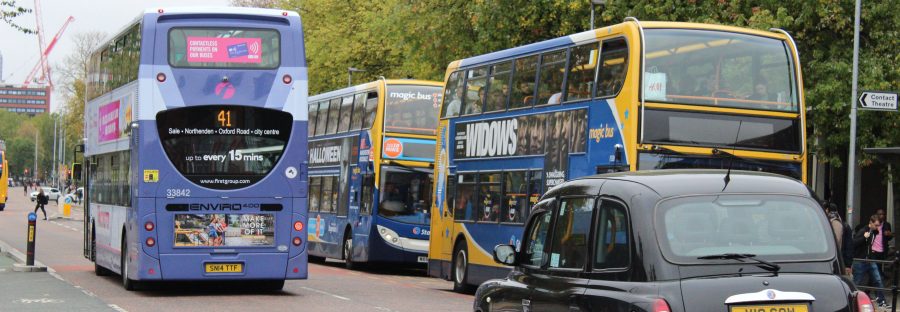Oxford Road pollution ‘cuts six months off a person’s life’, report claims
- Nitrogen dioxide levels causing more than 1,700 premature deaths per year in Greater Manchester.
- Oxford Road nitrogen dioxide levels have reached illegal levels since 2010
- City council plan to cut pollution required by end of the year
Manchester is undergoing a ‘pollution crisis’ with illegal nitrogen dioxide levels causing up to 1,781 premature deaths per year, figures reveal.
A report carried out by the Institute for Public Policy Research (IPPR) North and King’s College London estimates that ‘1.6m life years’ will be lost in Greater Manchester over the next century due to pollution.
This is the equivalent to a reduction six months’ life expectancy for every Greater Manchester resident.
A council pollutant monitoring station on Oxford Road has recorded illegal levels of NO2 since 2010, each year above the legal annual limit of 40 μg/m3. Manchester Piccadilly Gardens is also regularly above the legal limit.

Focus has been cast on the city’s ageing buses, which regularly run up and down the popular Oxford Road bus route.
Dutch-style cycle lanes were introduced in 2015 but have had a limited effect on nitrogen dioxide levels.
The IPPR report stated: “Urgent action needs to be taken concerning Greater Manchester’s heavily polluting bus fleet. In Greater Manchester over 20 per cent of all buses fall into the most polluting Euro 2–3 emission standard – in London this figure is just 12 per cent. In London 37 per cent of all buses are electric or meet Euro 6 standards, in Greater Manchester this is just 10 per cent.”
Plans to improve air quality and bring it down to legal levels are required by the end of the year.
The report added: “To achieve legal compliance Greater Manchester will need to begin restricting access to the city centre or introducing some form of charging clean air zone in the immediate future.”
The report states the pollution levels cost the local economy approximately £1bn a year, while BBC analysis of a recent World Health Organisation report found the city to be the third most polluted in the UK.
Dirty air is a killer, but also poverty is a killer
During his run for city mayor, Andy Burnham stated that there would “never be any charge on individual motorists” to tackle the air pollution crisis and said a charge on HGVs and buses would be “a long way down the line”.
Despite this, Councillor Angeliki Stogia, executive member for environment, planning and transport for the city council stated: “Clean Air Zones which involve financial penalties for the most polluting vehicles” are a possible solution to reducing pollutant levels.
“By far the biggest cause of this pollution, some 80% is transport – with diesel vehicles being the largest source.”
However, discussions of a pollutant charge has led to worries over the region’s poorest drivers being hit the hardest. Older, cheaper cars are most likely to be heavy pollutants.
Speaking to Manchester Evening News, Sir Richard Leese, leader of Manchester Council, said those on lower incomes would need to be given financial help from the government if a pollutant charge was introduced: “Clearly dirty air is a killer, but also poverty is a killer and the older cars tend to be driven by people on lower incomes who need that car to be able to work.
“Whatever we bring in needs to ensure the people at the bottom end of the chart don’t have to pay for it, either a scrappage scheme or an exemption scheme for people on low incomes – probably a combination of both.”


